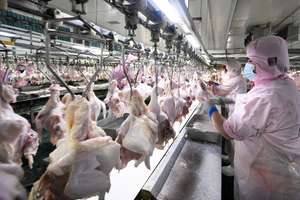Two Years After Deadly Nitrogen Leak at Georgia Poultry Plant, A Big Step Forward to Protect Immigrant Workers Reporting Labor Abuses
THE TORCH: CONTENTS By Shelly Anand, Elizabeth Zambrana, and Alessandra Stevens (Sur Legal Collaborative) and Michelle Lapointe (NILC)
January 27, 2023
Two years ago, on January 28, 2021, Gainesville, Georgia was the site of a tragic and entirely preventable liquid nitrogen leak at a poultry plant, which killed six workers. In the immediate aftermath of the tragedy, traumatized immigrant workers hesitated to come forward to report what they had witnessed because they feared employer retaliation, including a call to local police or Immigration and Customs Enforcement (ICE) and being put into and possible deportation proceedings. Their fears were not unfounded. Gainesville is in Hall County, which has a “287(g)” agreement with ICE, which deputizes local law enforcement to act as immigration agents.
The Gainesville poultry tragedy did not take place in a vacuum: immigrant workers experience 300 more workplace fatalities and 61,000 more workplace injuries per year, 37% receive less than minimum wage, and 76% experience wage theft. One national study found that undocumented workers experience minimum wage violations at nearly twice the rate of their U.S.-born counterparts in the same jobs. In 2020, immigrant workers made up 65% of worker deaths and in 2021, 727 immigrant workers from Latin America were killed on the job. These disparities can be directly tied to workers’ fear of reporting labor violations – workers who are unwilling to complain about safety violations on the job due to immigration enforcement concerns actually face greater job hazards and higher workplace injury rates. Workers who face firing, blacklisting, or deportation are more hesitant than others to take the risk of advocating for their workplace rights. Abusive employers routinely use threats of calls to ICE and police, implying possible deportation, to prevent immigrant workers from asserting their rights. These threats in turn intimidate immigrant workers to remain silent about these abuses due to fear of retaliation, being blacklisted in the local community, or the risk of deportation.
On January 13, 2023, the U.S. Department of Homeland Security (DHS) announced new guidance establishing a process for workers in labor disputes to apply for temporary protection from deportation. This guidance is a critical step to ensuring that immigrant workers like the Gainesville poultry workers can report serious labor violations without fear of adverse immigration consequences. Immigrant workers’ ability to speak up about workplace abuses is critical to holding exploitative employers accountable for their failure to follow our country’s labor laws and improves working conditions for all workers.
The new DHS guidance establishes a streamlined process for workers in labor disputes to apply for deferred action–a well-established form of prosecutorial discretion which provides temporary protection from deportation and work authorization. Work authorization is critical to affording immigrant whistleblowers protection against retaliation in violation of our country’s labor laws. This protection bolsters the ability of agencies, such as the U.S. Department of Labor (DOL), the Equal Employment Opportunity Commission (EEOC), the National Labor Relations Board (NLRB), and state and local labor agencies, to investigate allegations of workplace abuse and enforce workplace protections, including the right to a safe and healthy workplace free of discrimination and the right to be paid fairly for all hours worked. A letter of support from one of these agencies is an essential component of any request for deferred action under the new policy, and deferred action requests will be considered on a case-by-case basis.
DHS’ announcement follows years of organizing by immigrant workers and advocates across the country, including in Georgia and other parts of the Deep South. Both Sur Legal Collaborative and the National Immigrant Law Center (NILC) were a part of a rapid response coalition led by the poultry workers and local grassroots organizers in Gainesville in the wake of the nitrogen leak. Despite their fear of retaliation, workers bravely shared details with advocates, attorneys, and federal investigators about what transpired in the days leading up to the nitrogen leak and on the horrific day of the leak itself.
Because these workers spoke up, OSHA issued over $1 million in penalties against the four companies responsible for the nitrogen leak, the highest penalties possible under applicable statutes. On hearing this news, one worker said: “It is good that justice will be done for the death of our comrades… From now on, we are not going to remain silent, anything that we think is wrong, we will report.”
Knowing that these brave workers were coming forward during the OSHA investigation of the nitrogen leak, despite their fears of retaliation, our coalition joined the national efforts to secure some form of protection for these workers against retaliation. After months of advocacy, workers in Gainesville were among the first in the country under this administration to receive deferred action.
DHS’s announcement supporting labor agencies and workers in holding abusive employers accountable is an important step. NILC and Sur Legal Collaborative, and our coalition partners across the country, will continue to advocate for DHS, DOL, and the Biden administration to do more for immigrant workers. Specifically, the DOL should delegate U and T visa certifying authority to OSHA so that the agency can provide certifications to immigrant workers who are victims of trafficking and crimes in the workplace to support workers as they pursue more permanent immigration relief. DHS should ensure that workers who receive deferred action can renew that protection and should consider requests for prosecutorial discretion from individuals involved in civil rights disputes and private litigation. And DHS should end 287(g) agreements like the one in Hall County, which create a climate of fear in immigrant communities. Regardless, none of these actions is sufficient; Congress still needs to create a path for more permanent protection for these workers, including a process for them to become citizens.






